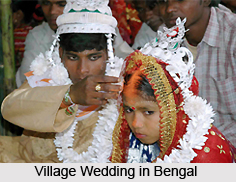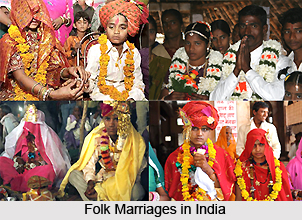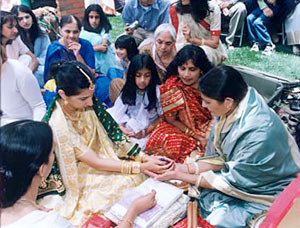 Wedding is known as the most significant social event in an Indian family. Every kind of social and economic obligation is included in wedding ceremonies. True efforts are put in arranging a wedding ceremony. Marriage ceremonies in Indian villages have special charm than the metropolitan and highly decked city marriages. In villages mostly arranged marriages are done. In village marriages the rituals and customs are looked in a more detailed manner. Each and every members of the family are concerned about each and every particulars of the wedding function. Since village marriages are mainly arranged marriages so the bride`s family looks after most of the wedding rules and regulations. As in these types of marriages the venue of the wedding is the bride`s home and may be the adjoined courtyard.
Wedding is known as the most significant social event in an Indian family. Every kind of social and economic obligation is included in wedding ceremonies. True efforts are put in arranging a wedding ceremony. Marriage ceremonies in Indian villages have special charm than the metropolitan and highly decked city marriages. In villages mostly arranged marriages are done. In village marriages the rituals and customs are looked in a more detailed manner. Each and every members of the family are concerned about each and every particulars of the wedding function. Since village marriages are mainly arranged marriages so the bride`s family looks after most of the wedding rules and regulations. As in these types of marriages the venue of the wedding is the bride`s home and may be the adjoined courtyard.
The rural wedding celebration is carried on for a long period of time as the whole family gathers to celebrate the marriage. In village marriages is not only for the family members but also close friends and relatives gather to celebrate. Even people from other villages come and join the wedding ceremony. Unlike the wedding planner in city marriages here the family members takes the entire responsibility to set up everything perfectly. They themselves look after the various departments of marriages. They themselves decide about the menu, the venue decoration and how the guests will be entertained. In these marriages, may be the glamour and gloss may be missing but the fun and enjoyment are constantly found in abundance. As people come and participate in song and dance program, fun and feast.
Earlier in rural societies wanted to get their daughters married in the pre puberty period. This became more of like a rule. But with the passage of time the concept changed. Now this rule is not that rigid and at some villages this practice is totally abandoned. The flexibility and the age of marriage are rising in villages, almost to the levels that are followed in cities. Though the law has decided a minimum age for marriage but such laws experience very negligible effect on real marriage practices.
 The custom of dowry is a major social evil in most of the rural parts of the country that has disastrous effects on the marriages in villages. This is becoming an increasingly heavy burden for the bride`s family. Although the government has issued so many anti dowry law the system of dowry, it has become an increasing social threat. Thus there are some drawbacks of marriages in villages, however these marriages promises love and affection to its every attendee. If the disadvantages can overcome with many more pleasure and merriment, only then these village marriages will be an affair to cherish.
The custom of dowry is a major social evil in most of the rural parts of the country that has disastrous effects on the marriages in villages. This is becoming an increasingly heavy burden for the bride`s family. Although the government has issued so many anti dowry law the system of dowry, it has become an increasing social threat. Thus there are some drawbacks of marriages in villages, however these marriages promises love and affection to its every attendee. If the disadvantages can overcome with many more pleasure and merriment, only then these village marriages will be an affair to cherish.
The Indian marriage system has undergone major changes in the last few decades. Many studies have expressed a development and intensification of dowry and increase in age at marriage. A survey in a village in Tamil Nadu, south India, showed that immense improvement in the style of marriages has occurred in the village after random preaching. Very soon the number of love marriages increased in the village and the marriage also came to a reasonable point. The survey came to the conclusion that these logical conclusions came only after the economic independence and personal autonomy among the younger generation in the village. These denote major changes in the socio-economic organization of the society.
Some parents begin to arrange the marriage on the birth of a child, but most wait until adolescent age. In the earlier times, the age of marriage was quite less and in a few small groups, especially in Rajasthan, children under the age of five are still offered for marriage. In rural communities, pre puberty marriage for girls conventionally was the rule. In the late twentieth century, the age of marriage is rising higher with passing years in villages, almost to the levels that are obtainable in the cities. Legislation mandating minimum marriage ages has been passed in various forms over the past decades, but such laws have little effect on actual marriage practices.
In rural areas, matches between strangers are usually arranged without the couple meeting each other. Rather, parents and other relatives come to an agreement on behalf of the couple. In cities, however, especially among the educated classes, photographs are exchanged, the bride and groom meet each other in the presence of their parents, they exchange few words and then the marriage is fixed after the parents and elders come to a firm decision.
Young professional men and their families may be given inquiries and photographs from representatives of several girls` families. Firstly the relatives go and meet the most promising and chosen brides and then go on tour themselves to meet the young women and make a final selection. In the early 1990s, growing numbers of marriages arranged in this way connected the brides and grooms from India with spouses of Indian parentage resident in Europe, North America, and the Middle East. The marriages in Indian villages till date follow almost all the traditional and conventional rules that are often omitted in the urbanized weddings.
More on Indian Wedding Accessories
More on Indian Religious Weddings
More on Types of Marriages
See also
 Wedding is known as the most significant social event in an Indian family. Every kind of social and economic obligation is included in wedding ceremonies. True efforts are put in arranging a wedding ceremony. Marriage ceremonies in Indian villages have special charm than the metropolitan and highly decked city marriages. In villages mostly arranged marriages are done. In village marriages the rituals and customs are looked in a more detailed manner. Each and every members of the family are concerned about each and every particulars of the wedding function. Since village marriages are mainly arranged marriages so the bride`s family looks after most of the wedding rules and regulations. As in these types of marriages the venue of the wedding is the bride`s home and may be the adjoined courtyard.
Wedding is known as the most significant social event in an Indian family. Every kind of social and economic obligation is included in wedding ceremonies. True efforts are put in arranging a wedding ceremony. Marriage ceremonies in Indian villages have special charm than the metropolitan and highly decked city marriages. In villages mostly arranged marriages are done. In village marriages the rituals and customs are looked in a more detailed manner. Each and every members of the family are concerned about each and every particulars of the wedding function. Since village marriages are mainly arranged marriages so the bride`s family looks after most of the wedding rules and regulations. As in these types of marriages the venue of the wedding is the bride`s home and may be the adjoined courtyard.
 The custom of dowry is a major social evil in most of the rural parts of the country that has disastrous effects on the marriages in villages. This is becoming an increasingly heavy burden for the bride`s family. Although the government has issued so many anti dowry law the system of dowry, it has become an increasing social threat. Thus there are some drawbacks of marriages in villages, however these marriages promises love and affection to its every attendee. If the disadvantages can overcome with many more pleasure and merriment, only then these village marriages will be an affair to cherish.
The custom of dowry is a major social evil in most of the rural parts of the country that has disastrous effects on the marriages in villages. This is becoming an increasingly heavy burden for the bride`s family. Although the government has issued so many anti dowry law the system of dowry, it has become an increasing social threat. Thus there are some drawbacks of marriages in villages, however these marriages promises love and affection to its every attendee. If the disadvantages can overcome with many more pleasure and merriment, only then these village marriages will be an affair to cherish.

















